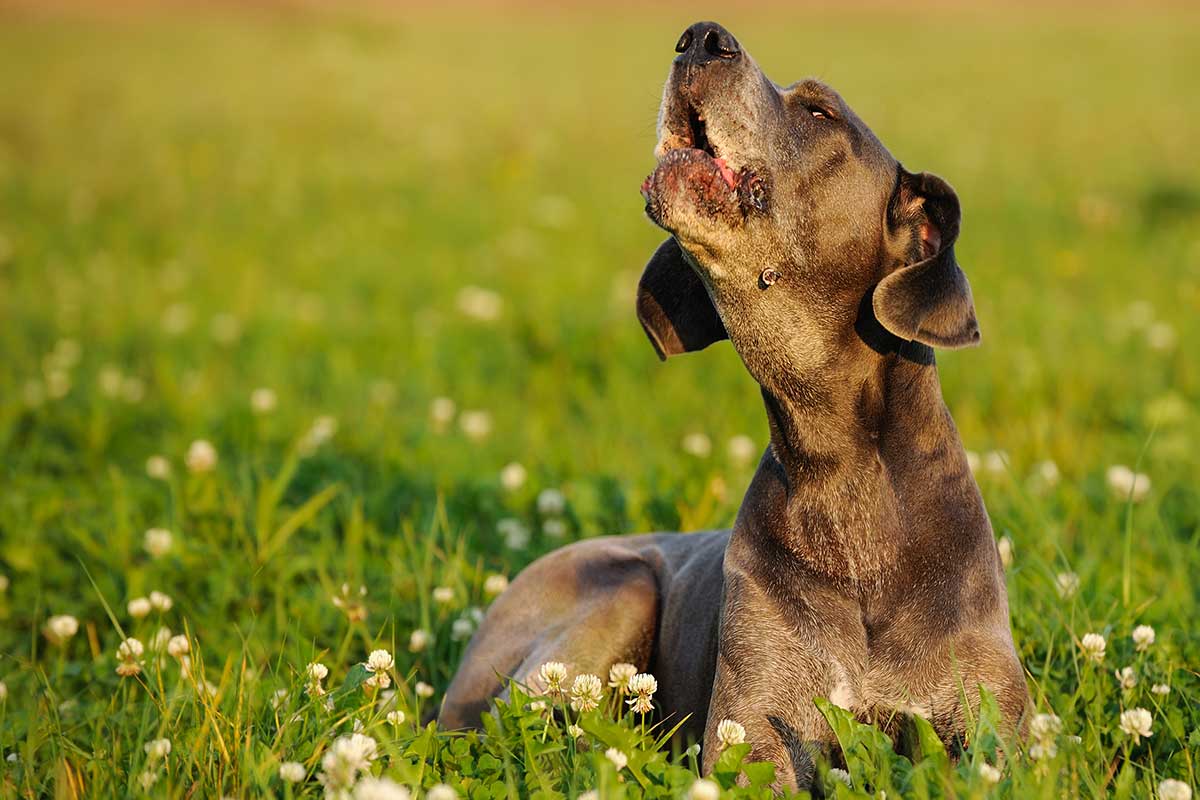A howl is a normal part of the canine communication repertoire, but some dog breeds howl more than others. The Northern types such as Alaskan Malamutes even use a typical “woo-woo” happy howl in conversation between each other and human family members.
[not_logged_in]Login or Join Today to Access the rest of the content[/not_logged_in]
[restrict userlevel=”subscriber”]We typically think of howls as a wolf trait, and it’s true that these wild cousins use howls in a haunting, effective manner, but other wild and domestic dogs howl, too. In my neck of the woods, coyotes serenade the evening moon, and house dogs sing along with their wild cousins. Despite popular memes to the contrary, dogs are not wolves—or coyotes—so exactly what’s up with all the arrrroooooo-ing? Why do dogs howl?
6 Reasons Why Dogs Howl
Howling appears to be an invitation to respond in kind. It’s not unusual for dogs to mistakenly respond to the “howl” from an ambulance siren. And my Magical-Dawg, my handsome German Shepherd boy, often howls in response to my singing. Everyone’s a critic. Here are more typical reasons for the doggy sing-along.
Long Distance Communication
While barks offer a sharp, percussive sound good for getting attention, howls are sustained on a long breath and carry much farther. When out and about, a howl can be heard over longer distances. Compare the canine alarm bark to a human “hey!” and the howl to the mountain climber’s sustained and melodic yodel.
Status Updates
Bays are a variation of howling, and certain hunting breeds offer this melodious “I’m hunting! Gonna catch him!” baying commentary. It’s designed to allow hunting partners to know the dog’s location and status of the hunt. The tone of the bay changes, for instance, once the raccoon or other varmint is treed.
Territorial Display
Other times, a howl may be a long-distance way to alert and warn other animals away from the howling dog’s territory. Some breeds may bay as a challenge toward a human stranger, too.
Separation Distress
In the same way, howls communicate emotion. Dogs may howl to express loneliness when they’re by themselves. Perhaps they’re calling, “Where are you? I’m over here, come join me.”
Attention-Seeking Howls
If howling has become an irksome problem, ask yourself what YOU do when your dog howls? Are you inadvertently rewarding the behavior with laughter or treats? Even bad attention is better than being ignored. So if he’s howling more in your presence, it may be for the attention.
Pain Or Illness
My Magical-Dawg this past spring began to howl for no reason we could figure out. I’d be working in my upstairs office, while he napped in the kitchen downstairs—and suddenly the low, mournful sound began. The cats weren’t teasing him, no siren or coyotes prompted the urge, and I wasn’t singing. He’d stopped joining me in the office (a lot of stairs for an aging doggy to climb), so I figured loneliness was the issue. But after a vet check a couple of days later for another issue and a prescription for doggy arthritis meds, Magic stopped howling. Yes, it’s true—dogs may start howling when they feel bad, whether from pain and illness or simply anxiety.
When your howling canine songster drives you nuts, it’s helpful to understand why he’s singing the song of his people. You can ignore the attention-seeking howls, reward the ones you like, and most importantly, get him a veterinary exam if the howls are not your fur-kid’s “normal” behavior.
This article was reviewed/edited by board-certified veterinary behaviorist Dr. Kenneth Martin and/or veterinary technician specialist in behavior Debbie Martin, LVT.
[/restrict]








